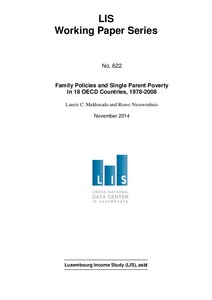Family policies and single parent poverty in 18 OECD countries, 1978-2008
"In this study, we examined to what extent family policies differently affect poverty among single-parent households and two-parent households. We distinguished between reconciliation policies (tested with parental leave and the proportion of unpaid leave) and financial support policies (tested...
| Main Authors: | , |
|---|---|
| Institution: | ETUI-European Trade Union Institute |
| Format: | TEXT |
| Language: | English |
| Published: |
Luxembourg
2014
LIS |
| Subjects: | |
| Online Access: | https://www.labourline.org/KENTIKA-19116004124919342869-Family-policies-and-single-par.htm |
| Summary: | "In this study, we examined to what extent family policies differently affect poverty among single-parent households and two-parent households. We distinguished between reconciliation policies (tested with parental leave and the proportion of unpaid leave) and financial support policies (tested with family allowances). We used data from the Luxembourg Income Study Database, covering 514,019 households in 18 OECD countries from 1978 to 2008, combined with data from the Comparative Family Policy Database. Our findings suggest that single- and two-parent households are less likely to be poor in countries that have longer parental leave, a smaller proportion of unpaid leave, and higher amounts of family allowances. Most notably, family policies reduced poverty to a greater extent among single-parent households. Paid leave more effectively facilitated the employment of single parents, thereby reducing their poverty more than among two-parent households. Family allowances decreased the risk of poverty of single-parent households relative to two-parent households in the Nordic countries, the Netherlands and Belgium, while increasing this relative risk in for instance Luxembourg, France, Germany and Ireland. Nevertheless, in absolute terms, in most countries family allowances were found to reduce a larger share of the poverty among single-parent households than among two-parent households." |
|---|---|
| Physical Description: | 30 p. Digital |

